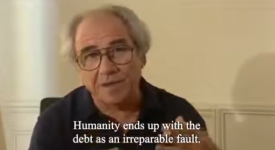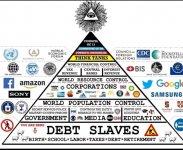You are using an out of date browser. It may not display this or other websites correctly.
You should upgrade or use an alternative browser.
You should upgrade or use an alternative browser.
Debt
- Thread starter version
- Start date
Once you’re in this kind of debt—and by “kind” I’m talking less about numbers than about my particular brand of debt—all those bills start not to matter anymore. If I allowed them to matter, I would become so panicked that I wouldn’t be able to work, which would only set me back further. I’ve also noticed that my kind of debt is surprisingly socially acceptable. After all, I went into debt for my education and my career—broad categories with room for copious rationalizations, and I make full use of them. I live in the most expensive city in the country because I have long believed that my career is dependent upon it. I spend money on Martinis and expensive dinners because, as is typical among my species of debtor, I tell myself that Martinis and expensive dinners are the entire point—the point of being young, the point of living in New York City, the point of living. In this frame of mind, the dollars spent, like the workings of a machine which no one bothers to understand, become an abstraction, a vehicle of taste.
There are days when my debt seems to be at the center of my being, a cancer that must be treated with the morphine of excuses and rationales and promises to myself that I’m going to come up with the big score—book advance, screenplay deal, Publishers Clearinghouse prize—and save myself. There are other days when the debt feels like someone else’s cancer, a tragedy outside myself, a condemned building next door that I try to avoid walking past. But the days when I can pretend that money is “only money” are growing farther and farther apart.

Meghan Daum: My Misspent Youth
How the author’s Manhattan dream turned into a credit-card nightmare.
WashYourHands
Cat Malogen
Debt-maxing too possibly
One of the more successful dealers I knew started with very low levels of credit via banks, slowly built his credit rating up and up, borrowed more to buy/sell more, always paid well in advance of any notice and when he got to about £200k cashed it in fucking the whole lot off to live in “x” quietly and undisturbed
Student loan debt, jfc imagine borrowing £15k for a bs course never to lead anywhere except relentless reminders
One of the more successful dealers I knew started with very low levels of credit via banks, slowly built his credit rating up and up, borrowed more to buy/sell more, always paid well in advance of any notice and when he got to about £200k cashed it in fucking the whole lot off to live in “x” quietly and undisturbed
Student loan debt, jfc imagine borrowing £15k for a bs course never to lead anywhere except relentless reminders
Student loan debt, jfc imagine borrowing £15k for a bs course never to lead anywhere except relentless reminders
One of my brothers went to uni to do music and had about a year and a half of his time there ravaged by COVID. Now he owes 50k and works in a bar.
Debt seems to hang over everything. A lot of people feel as though they're living on borrowed time. It's perhaps integral to Luke's contention of 'willing on the catastrophe'. Everyone bracing for the planetary backlash from what we've done to the environment, for it all to come crashing down.
It's a key component of the kind of self-flagellating politics that gets ripped on here too. The sense that everything you think and do should come with a caveat.
It's a key component of the kind of self-flagellating politics that gets ripped on here too. The sense that everything you think and do should come with a caveat.
sufi
lala
That article is from 1999 I wonder how are her finances now, did she move to Nebraska?
Meghan Daum: My Misspent Youth
How the author’s Manhattan dream turned into a credit-card nightmare.www.newyorker.com
That article is from 1999 I wonder how are her finances now, did she move to Nebraska?
She lives between New York and LA and has a podcast as well as writing and teaching. I think she's doing alright.

Biography — Meghan Daum
mixed_biscuits
_________________________
mixed_biscuits
_________________________
Vim or someone else with a greater understanding of economics will probably be able to explain why it's no big deal, but the sense that so much runs on this mechanism of borrowing and keeping the plates spinning is unnerving; so much reliance on momentum and deferral.
other_life
bioconfused
One of Mike Davis' targets in Planet of Slums is the World Bank and IMF's restructuring of Third World economies via debt leveraging.
The 1980s, when the IMF and World Bank used the leverage of debt to restructure the economies of most of the Third World, are the years when slums became an implacable future, not just for poor rural migrants, but also for millions of traditional urbanites, displaced or immiserated by the violence of ‘adjustment’.
Everywhere the IMF — acting as bailiff for the big banks and backed by the Reagan and Bush administrations — offered poor countries the same poisoned chalice of devaluation, privatization, removal of import controls and food subsidies, enforced cost-recovery in health and education, and ruthless downsizing of the public sector. (An infamous 1985 telegram from Treasury Secretary George Shultz to overseas USAID officials commanded: ‘in most cases, public sector firms should be privatized’.)



